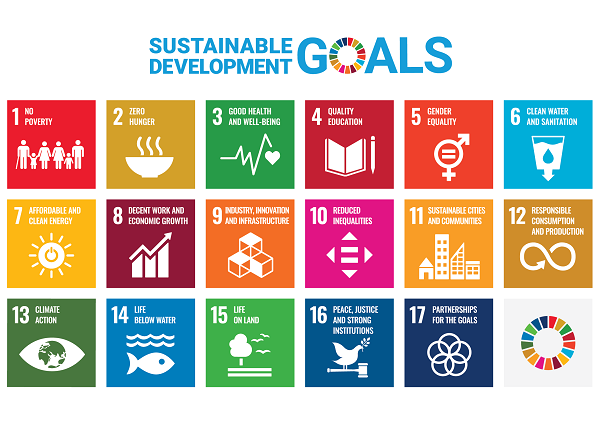SDGs and Kajima’s Business Operations
"As a group of individuals working together as one, we pursue creative progress and development founded on both rational, scientific principles and a humanitarian outlook, through which we strive to continually advance our business operations and contribute to society." Under this management philosophy, Kajima aims to be a corporate group valued by society and generates sustainable growth while addressing social and environmental issues.
Seven Material Issues
We look at social and environmental problems and identify material issues to take priority in addressing in order to increase corporate value and achieve sustainable growth together with society. Our initiatives for resolving social issues through business activities ultimately contribute to the SDGs.
Society
Creating functional urban, regional
and industrial infrastructure capable of
meeting new needs
Developing sustainable and
long-lasting social infrastructure
Providing technologies and services for disaster
preparedness that support safety and security
Environment
Contributing to carbon neutrality,
a circular economy, and
nature positivity
Platform for Business Sustainability
Focusing on unwavering technological innovation and Commitment to Kajima Quality
Construction that
emphasizes people
and partnerships
Practicing corporate ethics
Examples of Our Initiatives
Society
Creating functional urban, regional
and industrial infrastructure capable of meeting new needs
Haneda Innovation City connects the region to the world as a hub
for spawning and promoting new industries
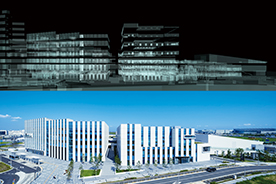
Haneda Future Development Co., Ltd., headed by Kajima, maintains and operates Haneda Innovation City. This complex has a total floor area of over 130,000 m2 and is directly connected to Tenkubashi Station, which is only one stop from Haneda Airport Terminal 3. Under the theme of fusing two core industries—"advanced technology" and "culture"—this complex, covering an expansive area at the gateway to Japan, aims to be a world-leading international center of industrial clusters and a base for unique Japanese culture, including food, music, art, and customs. A wide variety of complex facilities, such as those for R&D, advanced medicine, events, Japanese cultural experiences, and drinking and eating, have been developed and operated, and serve to create the first smart airport city in Japan through urban development designed to spawn and promote future-oriented experiences and value.
(SDG Targets: 9-4 and 11-3)
The Shikaoi Hydrogen Farm contributes to the local community
through resource circulation and application of natural energy
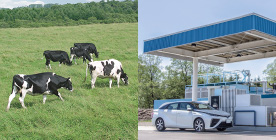
Shikaoi Hydrogen Farm Co., Ltd., based in Shikaoi Town, Kato County, Hokkaido, is the first company in Japan to supply hydrogen sourced from carbon-neutral biogas derived from livestock manure through production, marketing and other activities. The company is committed to promoting circulation of the Earths' resources and utilization of natural energy in its corporate philosophy, and seeks to contribute to the local community as a corporate member by establishing a business model revolving around the environmentally-friendly hydrogen supply business and evolving its business activities.
(SDG Target: 11-3)
Society
Developing sustainable and long-lasting social infrastructure
Development of the Smart Deck Renewal (SDR) system to reduce traffic restrictions and other effects associated with work to update road bridge decks
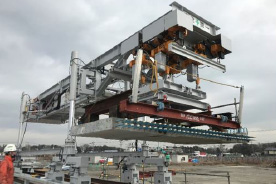
As those road bridges built during the period of rapid economic growth are aged and deteriorating at an alarming pace, we are facing with an urgent challenge that they are to be maintained properly and updated appropriately. Kajima has developed the Smart Deck Renewal (SDR)® system, which enables a substantial reduction of traffic restrictions during renewal construction of road bridge decks and is now implementing it at construction sites. Kajima’s goal is to contribute to extension of the life cycle of social infrastructure with minimizing social losses due to construction work.
(SDG Target: 9-1)
Development of seismic control technology for longer building life
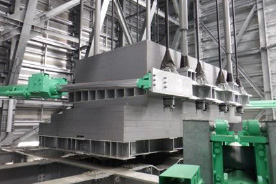
As an initiative to extend building life, Kajima has developed a special seismic control technology for skyscrapers called "D3SKY",which is Dual-direction Dynamic Damper of Simple Kajima stYle. This has already entered practical use and is accumulating a solid track record. This technology controls the vibration of the entire building by installing huge pendulum-shaped weights, called TMDs, on the roof. As the equipment is placed on the roof, there is no disturbance of views and loss of effective floor area. Furthermore, the impact on tenants can be significantly reduced since the main construction work is limited to outdoor areas. The D3SKY series comes in a wide range of variations, making it suitable for a variety of building sizes and applications, including new construction.
(SDG Target: 11-11b)
Society
Providing technologies and services for disaster preparedness
that support safety and security
Supporting Customers' BCPs in Both Physical and Digital Aspects
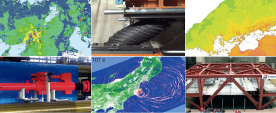
Natural disasters, which threaten people's lives, also have significant effects on corporate activities. Taking advantage of all the technological expertise that the Group owns in construction and related areas, Kajima provides services to offer both hardware- and software-based protection against different kinds of natural disasters. Examples include risk assessment, development of measures, anti-disaster work, and operational support. The goal is to help create a more resilient world by supporting optimal BCPs for both society at large and businesses in particular.
(SDG Target: 11-11b)
Disaster Recovery—A Mission for the Construction Industry
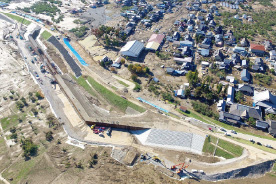
One mission for construction firms is to repair damage wrought by natural disasters. Kajima strives to complete recovery work as early as possible by exploiting all the technological, managerial, mobile, and other capabilities it has, in addition to placing the right people in the right jobs and getting the right equipment and materials to the right places in an emergency.
(SDG Targets: 11-5 and 13-1)
Environment
Contributing to carbon neutrality,
a circular economy, and nature positivity
CO2-SUICOM, concrete that absorbs CO2
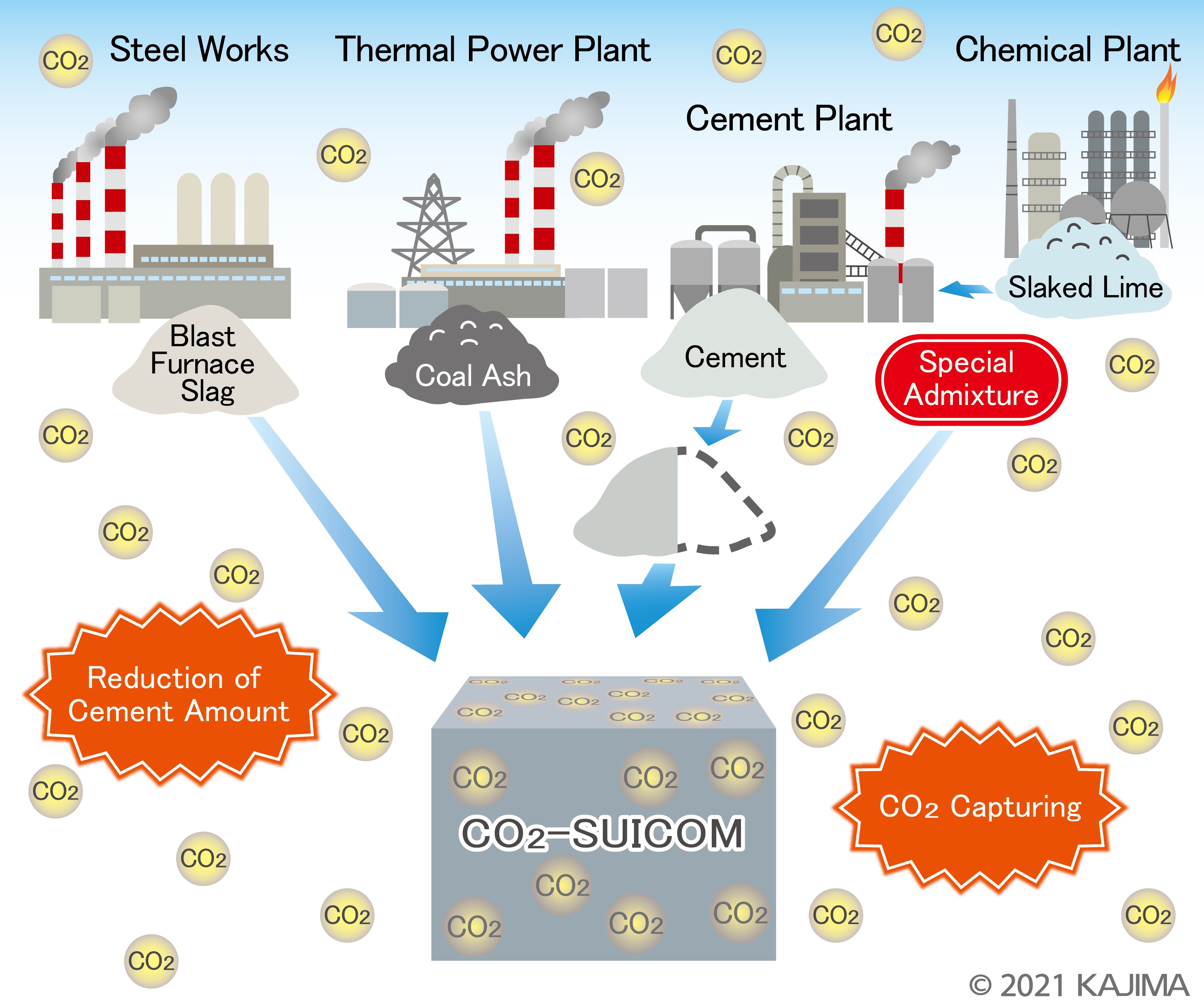
CO2-SUICOM is the ultimate in eco-friendly concrete, as it reduces CO2 emissions to virtually zero. It replaces more than half of the amount of cement with a special admixture (γ-C2S) and industrial byproducts to absorb and fix a large amount of CO2 as it hardens. One cubic meter of CO2 -SUICOM absorbs as much CO2 during production as a 20-meter-high Japanese cedar tree absorbs during a year.
To expand its implementation further, Kajima is now tackling various challenges such as its supply system development, cost reduction, and cast-in-place application.
(SDG Targets: 9-4 and 13-1)
More information
Construction of the offshore wind farms at Akita Port and Noshiro Port
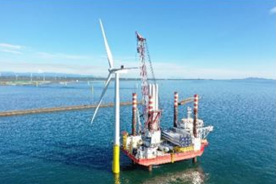
Kajima constructed offshore wind power generation facilities at the two locations of Akita Port and Noshiro Port, with a total of 33 wind turbines having 117-meter-diameter blades. Kajima aims to address energy issues by emphasizing Construction of the offshore wind farms at Akita Port and Noshiro Port, which are expected to be in high demand in the near future.
(SDG Targets: 7-2 and 13-1)
Environment friendly architecture that helps to create a carbon neutral society
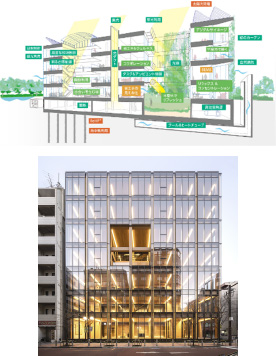
As efforts toward carbon neutrality, Zero Energy Building (ZEB) evaluation and certification are gaining momentum. Kajima promotes ZEBs from a broad perspective and works to create energy-saving buildings that provide spaces that contribute to safety, security, wellness, intellectual productivity, etc.
At the same time, Kajima also takes initiatives to promote wooden buildings and structures with the goal of facilitating cyclic use of forest resources and reducing CO2 emissions from the production of building materials. The JUTEC Head Office Building is the first multi-story building to adopt FR Wood®, a laminated pure-wood fire-resistant structural lumber developed by Kajima.
(SDG Targets: 9-4 and 13-1)
Platform for Business Sustainability
Focusing on unwavering technological innovation
and Kajima quality
ICT-Based Next-Generation smart construction system
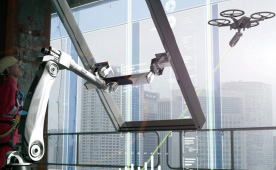
Kajima is promoting the Kajima smart construction technologies, designed to reform all production processes involved in construction work, in order to increase productivity and reform work practices at construction sites. Under the three core concepts of "half of the work with robots," "half of project management done remotely," and "digitization of all processes," the project aims to make the construction industry more attractive and inspiring by utilizing advanced ICT and various robots as well as devising innovative on-site management methods.
(SDG Targets: 11-3 and 12-5)
A4CSEL, new technology that transforms construction sites into "factories"
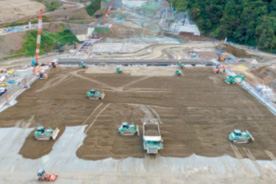
Kajima has been working on the development of A4CSEL®. This is a next-generation construction production system based on automated construction machinery, to provide a fundamental solution to problems faced by the construction industry, such as the labor shortage, low labor productivity, and high frequency of industrial accidents. The aim is to increase the safety of construction work by allowing multiple automated construction machines to be controlled by a small number of workers. Its application has been expanded to dams and tunnels construction.
(SDG Targets: 11-3 and 12-5)
More information
Platform for Business Sustainability
Construction that emphasizes people and partnerships
Work conditions improved to make construction sites more attractive workplaces
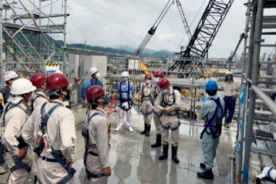
The problem of securing the next generation workforce is an urgent one that the construction industry needs to solve to make the industry sustainable. Aiming to realize coexistence and coprosperity across the whole supply chain, Kajima is working to evolve construction into a more attractive industry by pursuing a safer and more secure working environment for workers while at the same time improving their working conditions and benefits. Measures include providing better working environment and raising wages.
(SDG Target: 8-5)
Diversity, Equity & Inclusion
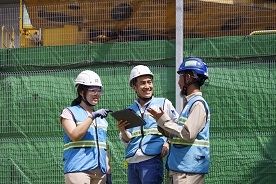
Kajima aims to be a vibrant corporate group by respecting diverse attributes and values, such as gender, nationality, and disability, and creating a work environment that enables individual employees to fully demonstrate their abilities. Furthermore, the group promotes work-life balance and supports diverse work-styles so that employees can balance their work and personal lives. The goal is to enable all employees and their families to lead healthy, fulfilling lives, both at work and at home.
(SDG Target: 5-5)
Platform for Business Sustainability
Practicing corporate ethics
Respecting Human Rights
Conducting Fair Business Practices

Kajima promotes fair and sincere corporate activities by working in line with measures for thorough compliance and risk management.
In addition, the Group has established, and strives to observe, the Kajima Group Human Rights Policy. It works hard across the entire supply chain to earn greater trust from customers and society while individual board members and employees of the Group act with a strong sense of ethics.
(SDG target: 16)
About the SDGs
Seventeen Goals to Change the World
The Sustainable Development Goals (SDGs) were adopted by the United Nations (UN) in 2015. The 193 UN member countries all aim to achieve the SDGs within the 15-year period from 2016 to 2030. In other words, the SDGs represent tasks that all the people on Earth should work on. The preamble to the 2030 Agenda for Sustainable Development states, "This Agenda is a plan of action for people, planet and prosperity," and this document sets forth the 17 Sustainable Development Goals and 169 targets to achieve within the 15-year period from 2016 to 2030.
